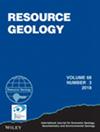中国东北大兴安岭南部长春岭铅锌矿床的流体演化与成因:流体包裹体和H-O-S-铅同位素的制约因素
IF 0.8
4区 地球科学
Q3 GEOLOGY
引用次数: 0
摘要
大兴安岭(SGXR)南部是中国东北中亚造山带(CAOB)东部的一个重要多金属成矿带,蕴藏着大量铜、铁、铅、锌、金等矿床。长春岭铅锌矿床位于上甘岭东段,主要赋存于二叠系砾岩和粉砂岩单元中。矿床的副成因序列可分为三个阶段,包括砷黄铁矿-石英(第一阶段)、黄铁矿-闪锌矿-方铅矿-石英(第二阶段)和贫瘠石英-碳酸盐岩(第三阶段)。流体包裹体(FIs)微测温研究表明,在含矿石英脉中只观察到富液水包裹体(VL 型 FIs)。阶段 I、II 和 III 的 FIs 均化温度分别为 190-314、170-268 和 140-195°C,盐度分别为 9.73-13.44、7.86-10.74 和 4.94-5.99 wt% NaCl eqv.。成矿流体的特点是 H2O-NaCl 流体系统温度低、盐度低。δ18OH2O和δD值分别为-11.8‰至0‰和-120.4‰至-99.9‰,表明流体的来源主要来自岩浆水和陨石水的混合流体。流体冷却、混合和流体-岩石反应是长春岭主要的矿石沉淀机制。黄铁矿和闪锌矿的硫铅同位素(δ34S = 2.3‰-3.7‰,206Pb/204Pb = 18.259-18.285,207Pb/204Pb = 15.544-15.57,208Pb/204Pb = 38.136-38.215)表明矿石金属来源于岩浆。综合现有的地质、成矿、流体包裹体和 H-O-S-Pb 同位素证据,我们得出结论:长春岭铅锌矿床是一个表生系统,与区域性铅锌多金属矿床有许多相似之处。本文章由计算机程序翻译,如有差异,请以英文原文为准。
Fluid evolution and genesis of the Changchunling Pb–Zn deposit in the Southern Great Xing'an Range, Northeast China: Constraints from fluid inclusions and H–O–S–Pb isotopes
The southern Great Xing'an Range (SGXR), an important polymetallic metallogenic province in the eastern Central Asian Orogenic Belt (CAOB) in Northeast China, containing numerous ore deposits of Cu, Fe, Pb, Zn, Au, and so forth. The Changchunling Pb–Zn deposit, located in the eastern segment of the SGXR, is primarily hosted by a Permian conglomerate and siltstone unit. The paragenetic sequence of the deposit can be divided into three stages involving arsenopyrite–quartz (stage I); pyrite–sphalerite–galena–quartz (stage II); and barren quartz–carbonate (stage III). Fluid inclusion (FIs) microthermometric studies revealed that only liquid‐rich aqueous inclusions (VL‐type FIs) are observed in the ore‐bearing quartz veins. The FIs of stages I, II, and III yield homogenization temperatures of 190–314, 170–268, and 140–195°C with salinities of 9.73–13.44, 7.86–10.74, and 4.94–5.99 wt% NaCl eqv., respectively. The ore‐forming fluids are characterized by low temperature and low salinity of the H2 O–NaCl fluid system. The δ18 OH2O and δD values range from −11.8‰ to 0‰ and −120.4‰ to −99.9‰, respectively, indicating that the source of the fluids was primarily derived from a mixed fluid of magmatic water and meteoric water. Fluid cooling, mixing and fluid‐rock reactions were the major ore precipitation mechanisms at Chanchunling. Sulfur‐lead isotopes of pyrite and sphalerite (δ34 S = 2.3‰–3.7‰, 206 Pb/204 Pb = 18.259–18.285, 207 Pb/204 Pb = 15.544–15.57, and 208 Pb/204 Pb = 38.136–38.215) indicate that ore metals had a magmatic source. Integrating the available geological, mineralization, fluid inclusion, and H–O–S–Pb isotope evidence, we conclude that the Changchunling Pb–Zn deposit is an epithermal system, which shares many similar features with the regional Pb–Zn polymetallic deposit.
求助全文
通过发布文献求助,成功后即可免费获取论文全文。
去求助
来源期刊

Resource Geology
地学-地质学
CiteScore
2.30
自引率
14.30%
发文量
18
审稿时长
12 months
期刊介绍:
Resource Geology is an international journal focusing on economic geology, geochemistry and environmental geology. Its purpose is to contribute to the promotion of earth sciences related to metallic and non-metallic mineral deposits mainly in Asia, Oceania and the Circum-Pacific region, although other parts of the world are also considered.
Launched in 1998 by the Society for Resource Geology, the journal is published quarterly in English, making it more accessible to the international geological community. The journal publishes high quality papers of interest to those engaged in research and exploration of mineral deposits.
 求助内容:
求助内容: 应助结果提醒方式:
应助结果提醒方式:


